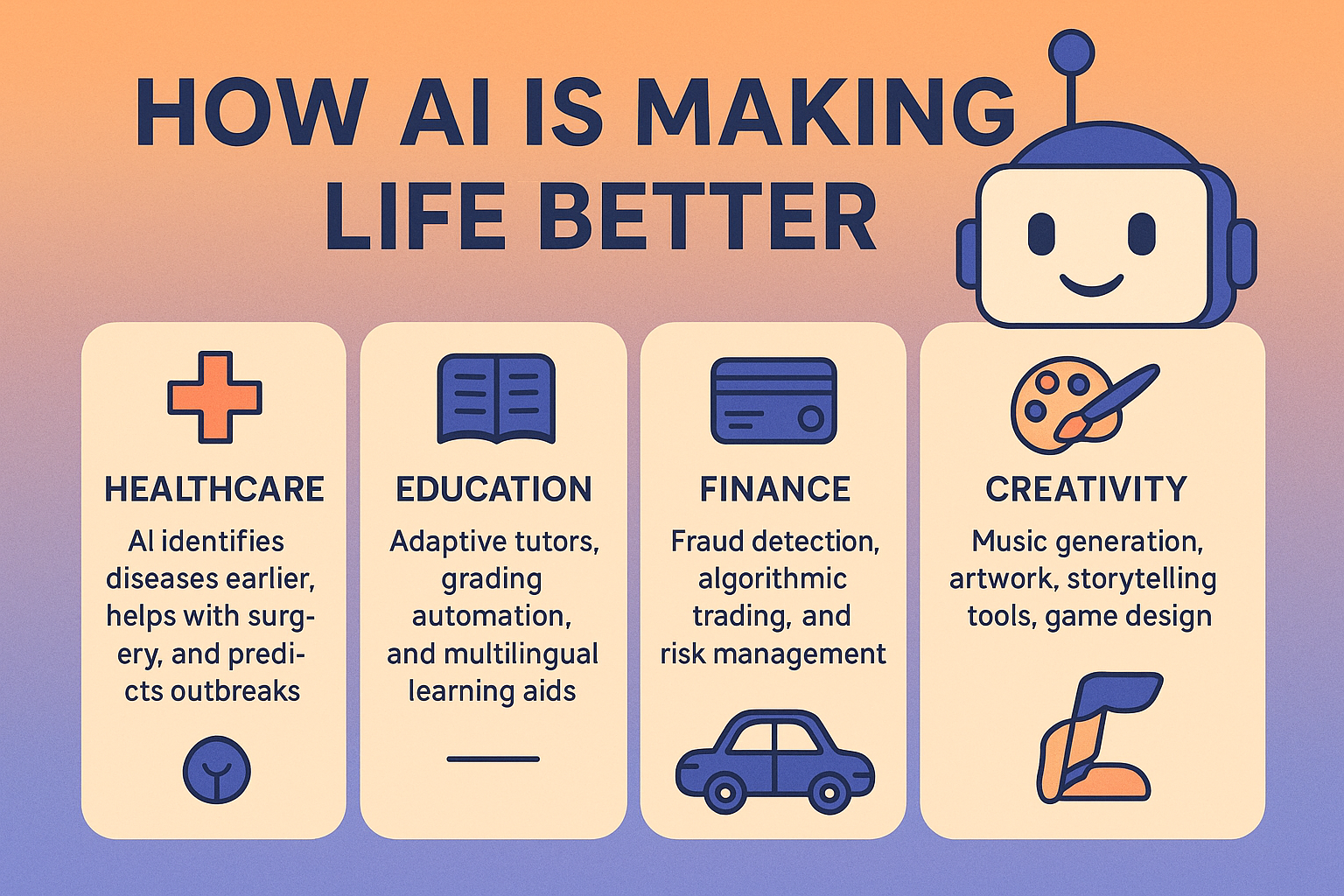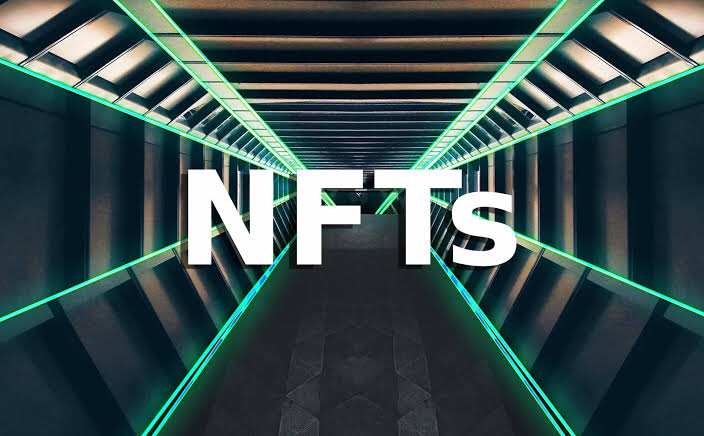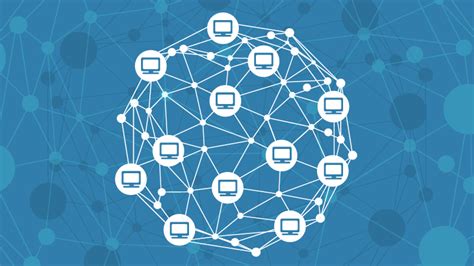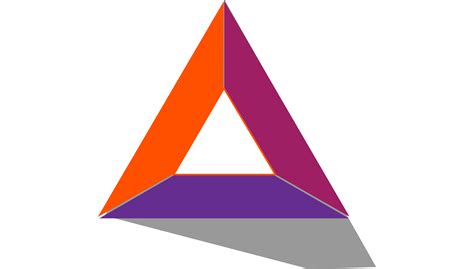Artificial Intelligence (AI) is no longer a futuristic concept—it’s already transforming everyday life across healthcare, education, finance, transportation, and the creative arts. From preventing medical errors to reinventing how we learn and move, AI technologies are improving lives with measurable, evidence-backed results. Here’s how AI is making life better, one industry at a time.
Revolutionizing Healthcare with Precision and Prevention
AI’s most profound impact may be in healthcare, where early diagnosis and error reduction are saving lives. Microsoft’s new health AI, MAI‑DxO, demonstrated a diagnostic accuracy of 85.5% across 304 complex cases—far outperforming human physicians who scored only around 20% under the same conditions (Business Insider). In Nairobi, a silent AI assistant called “AI Consult” helped reduce diagnostic errors by 16% and treatment errors by 13% in real-world clinics (Time). Cedars-Sinai’s AI-powered triage system has already guided over 42,000 patients, with 77% of its treatment suggestions deemed optimal.
Doctors also benefit. AI scribes in the UK are alleviating administrative burdens—4 in 5 GPs said AI tools helped them focus more on patients, less on paperwork. As Stanford’s Erik Brynjolfsson puts it, “AI will be as common in healthcare as the stethoscope” (Stanford GSB).
Education Transformed by Intelligent Tutoring and Accessibility
AI is leveling the educational playing field through personalized learning. A meta-analysis of 50 studies found that intelligent tutoring systems (ITS) improved outcomes in 92% of cases, with an average effect size of d = 0.66, equivalent to raising students from the 50th to the 75th percentile (Wikipedia). Platforms like Korbit showed 2–2.5× learning gains versus MOOCs (arXiv).
According to a global review, 86% of adaptive learning implementations reported positive learning outcomes. Tools like Duolingo, Khan Academy, and AI-powered note-taking assistants are also helping multilingual learners, neurodiverse students, and those with disabilities thrive (Nature).
AI in Finance: Stopping Fraud, Personalizing Banking
AI is supercharging financial security and decision-making. Cutting-edge fraud detection models using SHAP and XGBoost techniques have achieved AUC-ROC scores up to 0.99, slashing false positives while improving real-time alerts (arXiv). McKinsey reports a 30% cost reduction in fraud operations, and 63% of firms cite AI as essential to stopping scams (Mastercard).
AI also powers robo-advisors, credit scoring, and algorithmic trading. As financial services become increasingly personalized, AI ensures safer, smarter banking experiences.
Smarter, Safer Transportation Through AI
Self-driving technologies are already outperforming human drivers. Waymo vehicles have logged over 7 million miles with only 3 injury-related crashes, demonstrating 92% fewer pedestrian collisions and 82% fewer with motorcycles than human drivers (Wikipedia). Smart traffic systems like Surtrac have cut drive times by 25% and idling time by 40%, making cities greener and more efficient.
Trucking fleets using AI for route optimization and predictive maintenance see 10–20% fuel savings, while smart logistics reduce delays and emissions (PatentPC).
Creativity Augmented: Not Replaced
Creative AI is enhancing rather than replacing human ingenuity. Studies show that tools like DALL·E and Midjourney increase creative output by 25%, with users producing higher-rated artwork and narratives when assisted by AI (PNAS Nexus). Platforms like Runway AI, Microsoft’s VASA‑1, and Vizcom are redefining animation, music, and video editing workflows (TechRadar).
Still, the creative sector faces disruption. CISAC estimates a €22 billion income loss for creators by 2028 due to generative AI bypassing IP protections (CISAC), and the British Film Institute warns of script exploitation by large models (The Guardian).
Ethical Frameworks and Future Outlook
The path forward requires balanced innovation. AI’s future will depend on transparent design, explainability, and human oversight. New ethical frameworks, like Hofman’s six-theory compass and Adobe’s “content credentials” initiative, aim to protect creators while fostering responsible AI growth (Harvard Law Review).
Looking ahead, AI will drive the next wave of personalization in finance, smarter cities, and creativity-on-demand—if implemented ethically.
📊 Summary Infographic
| Industry | Impact Metric | Key Quote |
|---|---|---|
| Healthcare | 85.5% AI diagnostic accuracy (MAI-DxO) | “AI will be as common as the stethoscope.” – Stanford |
| Education | 2–2.5× learning gains via AI tutors | “92% of studies show ITS improves outcomes.” |
| Finance | 0.99 AUC-ROC in fraud detection | “AI combats fraud more effectively than legacy systems.” |
| Transportation | 92% fewer pedestrian collisions (Waymo) | “Robotaxis are already safer than human drivers.” |
| Creativity | 25% increase in rated creativity with AI tools | “AI helps artists focus on storytelling.” – Stability AI |
For more on this topic, check out:
🧠 Optimize your understanding of AI’s real-world benefits and challenges. Whether you’re a business leader, educator, artist, or healthcare professional, now’s the time to explore how AI can elevate your work.
– Man Who Knows Nothing




